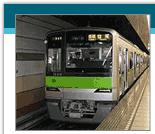![]() Japanese Trains にほんのでんしゃ(日本の電車)
Japanese Trains にほんのでんしゃ(日本の電車)

Harajuku refers to the area around Tokyo's Harajuku Station, one station north of Shibuya on the Yamanote Line. From local trains to shinkansen (bullet trains),
Japanese trains are typically classified into the following categories:
| かくえきていしゃ Or ふつでんしゃ | Local (kakueki-teisha or futsu-densha) Local trains stop at every station. |
| かいそく | Rapid (kaisoku) Rapid trains skip some stations. There is no difference in the ticket price between local and rapid trains. |
| きゅこ | Express (kyuko) Express trains (kyuko) stop at even fewer stations than rapid trains (kaisoku). In case of JR (Japan Railways), an express fee has to be paid in addition to the base fare. |
| とっきゅ | Limited Express (tokkyu) Limited express trains stop only at major stations. A limited express fee has to be paid in addition to the base fare. It is typically between 500 and 4,000 Yen. In case of some non-JR railway companies, no "limited express fee" has to be paid. |
| しんかんせん | Super Express (shinkansen) Shinkansen (bullet trains) are only operated by JR (Japan Railways). Shinkansen use separate tracks and platforms. A limited express fee has to be paid in addition to the base fare. It is typically between 800 and 8000 Yen. |
![]() Writing Practice
Writing Practice
You have learned how to conjugate verbs in many ways in the past. Do you remember how they conjugate? In Japanese, the present tense and the future tense take the same form as the ます or ませんform of verbs. For past tense, the ました orませんでしたform is used. For activities going on at the time, or for things that are ongoing, the present progressive form of Verbています is used.
Here is an example of both these forms of verbs in the various tenses to review with.
私のかぞく(家族)はりょこう(旅行)をします。My family will take a trip.
私の家族は旅行をしません。My family will not take a trip.
私の家族は旅行をしました。My family took a trip.
私の家族は旅行をしませんでした。My family didn’t take a trip.
いま(今)私の家族は旅行をそしっています。My family is taking a trip (right now).
まいとし(毎年)私の家族は旅行をしっています。May family takes a trip every year.
Practice composing the sentences you see here in English in Japanese. Be sure to note the correct verb form needed for each sentence (present, past, positive, negative, or present progressive/ongoing). Click each sentence to see if you are correct.
| I will travel (take/do a trip) to Japan. | 私は日本に旅行します。 |
| I am not going to go with my elder sister. | 私は姉と行きません。 |
| I am putting clothes in my suitcase now. | 私は今スーツケースにふく(服)を入れています。 |
| We are going to buy tickets. | 私達はきっぷ(切符)を買います。 |
| I always travel by plane. | 私はいつもひこうき(飛行機)で旅行しています。 |
| I went to the airport. And then I went to the airline counter. | 私は空港に行きました。それから、コウンターに行きました。 |
| An agent at the airline counter told me to give him my passport and ticket. | カウンターの人は「パスポートときっぷ(切符)を見せて下さい。」と言いました。 |
| We did not talk with an agent at the airline counter. | 私達はカウンターの人は話しませんでした。 |
| My mom bought some souvenirs. | 母はおみやげ(お土産)を買いました。 |
| We will go through the security check next. | 私達はつぎにけんさ(検査)をします。 |
| We waited in the waiting room for two hours. | 私達はまちあいしつ(待合室)で二時間まちした(待ちました)。 |
| I did not sit in a window seat. | 私はまどがわのせき(窓側の席)に座りませんでした。 |
| I am reading a book now. | 今私は本を読んでいます。 |
Here is one more tongue twister to finish out the year in this course. Listen to this one as many times as you need to because you may be recording yourself reciting it in an assignment.
Click the Play button to listen.
しんかんせん、 The bullet train goes along the |
![]() Graded Assignments
Graded Assignments
Please return to the Section 1 Tasks & Assignments folder to complete the graded assignments for Section1, Part F.

